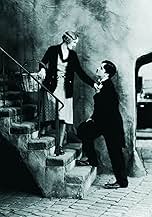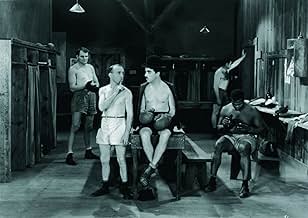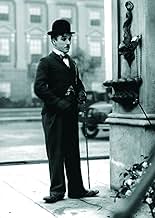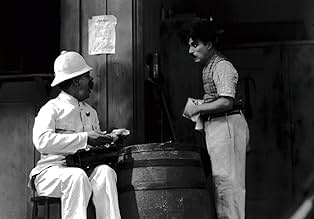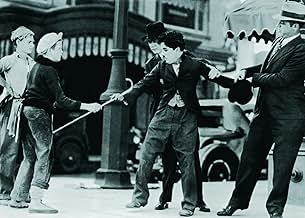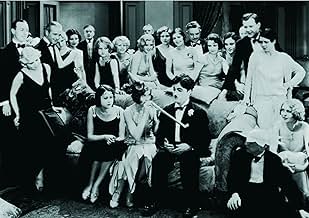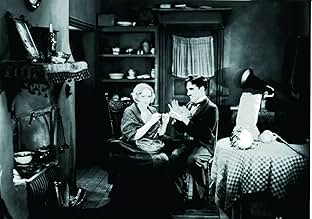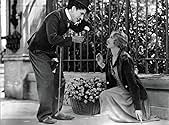Mithilfe eines reichen, aber launischen Gewohnheitstrinkers häuft ein vertrauensseliger Vagabund, der sich in ein blindes Blumenmädchen verliebt hat, möglichst viel Geld an, um ihr medizinis... Alles lesenMithilfe eines reichen, aber launischen Gewohnheitstrinkers häuft ein vertrauensseliger Vagabund, der sich in ein blindes Blumenmädchen verliebt hat, möglichst viel Geld an, um ihr medizinische Hilfe zukommen zu lassen.Mithilfe eines reichen, aber launischen Gewohnheitstrinkers häuft ein vertrauensseliger Vagabund, der sich in ein blindes Blumenmädchen verliebt hat, möglichst viel Geld an, um ihr medizinische Hilfe zukommen zu lassen.
- Regie
- Drehbuch
- Hauptbesetzung
- Auszeichnungen
- 6 wins total
Charles Chaplin
- A Tramp
- (as Charlie Chaplin)
Al Ernest Garcia
- The Millionaire's Butler
- (as Allan Garcia)
Johnny Aber
- Newsboy
- (Nicht genannt)
Jack Alexander
- Boxing Match Spectator
- (Nicht genannt)
T.S. Alexander
- Doctor
- (Nicht genannt)
Victor Alexander
- Superstitious Boxer
- (Nicht genannt)
Albert Austin
- Street Sweeper
- (Nicht genannt)
- …
Harry Ayers
- Cop
- (Nicht genannt)
Eddie Baker
- Boxing Fight Referee
- (Nicht genannt)
Henry Bergman
- Mayor
- (Nicht genannt)
- …
Edward Biby
- Nightclub Patron
- (Nicht genannt)
Betty Blair
- Woman at Center of Table in Restaurant
- (Nicht genannt)
Buster Brodie
- Bald Party Guest
- (Nicht genannt)
Jeanne Carpenter
- Diner in Restaurant
- (Nicht genannt)
Zusammenfassung
Reviewers say 'City Lights' is celebrated for its blend of comedy and pathos, showcasing Charlie Chaplin's iconic Tramp character in a poignant love story with a blind flower girl. The film is praised for its masterful physical comedy, expressive acting, and memorable scenes, particularly the boxing match and the emotional finale. Chaplin's direction, composition of the score, and the film's historical significance are frequently highlighted. However, some reviewers note that the silent format and slow pacing may challenge modern audiences. The themes of love, selflessness, and social commentary resonate deeply, making 'City Lights' a timeless classic.
Empfohlene Bewertungen
Chaplin takes himself a little more seriously in City Lights, and the results are spectacular. The musical score which Chaplin composed for the film was one of the many highlights, and even though Charlie's performance is much more dramatic than usual in some scenes, the hilarious comedy for which he is known and loved is still abundant.
City Lights is so well made that it is one of the very few movies in which the obvious flaws can be gladly overlooked. Yes, you can clearly see the string holding Chaplin up in the sidesplittingly funny boxing scene, but who cares? That is such classic slapstick that little things like that really don't matter. Besides, let's keep in mind that this movie was made seventy years ago.
Chaplin does a phenomenal job in his traditional role of the tramp, and develops a perfectly convincing romantic relationship with the blind flower girl on the sidewalk. His friendship with the drunken rich guy is hilarious, but it also makes a significant comment about the problems of alcohol. This is truly a great film, which should not be forgotten.
City Lights is so well made that it is one of the very few movies in which the obvious flaws can be gladly overlooked. Yes, you can clearly see the string holding Chaplin up in the sidesplittingly funny boxing scene, but who cares? That is such classic slapstick that little things like that really don't matter. Besides, let's keep in mind that this movie was made seventy years ago.
Chaplin does a phenomenal job in his traditional role of the tramp, and develops a perfectly convincing romantic relationship with the blind flower girl on the sidewalk. His friendship with the drunken rich guy is hilarious, but it also makes a significant comment about the problems of alcohol. This is truly a great film, which should not be forgotten.
This is my favorite Chaplin film, but I don't want that to diminish his other work, either. MODERN TIMES was an outstanding work of social satire, THE GOLD RUSH was great slapstick, and even the largely-neglected MONSIEUR VERDOUX strikes a certain unforgettable tone. Chaplin didn't make a bad movie, and I'm not even sure that CL is his best, exactly. But it IS my favorite, if only for the ending.
That ending has been the subject of much comment here. I think it's a masterpiece in a single scene. Chaplin's little tramp has never seemed less like a character and more like a living, breathing human being. It's a monument to understated sentimentality.
To me, the rest of the film exists largely to set the context for that one magnificent piece of celluloid. Yes, the boxing scene is great, and the scene where he rescues the millionaire is also wonderful, but it's that ending that makes us all love this movie.
That ending has been the subject of much comment here. I think it's a masterpiece in a single scene. Chaplin's little tramp has never seemed less like a character and more like a living, breathing human being. It's a monument to understated sentimentality.
To me, the rest of the film exists largely to set the context for that one magnificent piece of celluloid. Yes, the boxing scene is great, and the scene where he rescues the millionaire is also wonderful, but it's that ending that makes us all love this movie.
If there is one Charlie Chaplin film to recommend, as others have pointed to in the past, City Lights is the one. Though Chaplin played his Tramp character superbly in other movies, like Modern Times and The Gold Rush, City Lights displays the Tramp at his funniest, his bravest, his most romantic, and his most sympathetic. It's tough for filmmakers in recent days to bring the audience so close emotionally with the characters, but it's pulled off.
The film centers on three characters- the Tramp, the quintessential, funny homeless man who blends into the crowd, but gets caught in predicaments. He helps a drunken businessman (Myers, a fine performance in his own right) from suicide, and becomes his on and off again friend (that is, when it suits him and doesn't notice his 'friend's' state). The other person in the Tramp's life is the Blind Flower Girl (Virginia Cherrill, one of the most absorbing, beautiful, and key female performances in silent film), who are quite fond of each other despite the lack of total perception. The emotional centerpiece comes in obtaining rent and eye surgery money, which leads to a (how else can I put it) magical boxing match where it's basically a 180 from the brutality and viscerality of a match in say Raging Bull.
Though there is no dialog, the film achieves a timelessness- it's essentially a tale of two loners who find each other, lose each other, and find each other again (the last scene, widely discussed by critics for decades, is moving if not tear-inducing). And it's never, ever boring- once you get along with the Tramp, you find the little things about him, the reaction shots, the little things he does after the usual big gag (look to the ballroom scene for examples of this, or when he gets a bottle of wine poured down his pants without the other guy noticing). Truth be told, if this film makes you indifferent, never watch Chaplin again. But if you give yourself to the film, you may find it's one of the most charming from the era, or perhaps any era.
The film centers on three characters- the Tramp, the quintessential, funny homeless man who blends into the crowd, but gets caught in predicaments. He helps a drunken businessman (Myers, a fine performance in his own right) from suicide, and becomes his on and off again friend (that is, when it suits him and doesn't notice his 'friend's' state). The other person in the Tramp's life is the Blind Flower Girl (Virginia Cherrill, one of the most absorbing, beautiful, and key female performances in silent film), who are quite fond of each other despite the lack of total perception. The emotional centerpiece comes in obtaining rent and eye surgery money, which leads to a (how else can I put it) magical boxing match where it's basically a 180 from the brutality and viscerality of a match in say Raging Bull.
Though there is no dialog, the film achieves a timelessness- it's essentially a tale of two loners who find each other, lose each other, and find each other again (the last scene, widely discussed by critics for decades, is moving if not tear-inducing). And it's never, ever boring- once you get along with the Tramp, you find the little things about him, the reaction shots, the little things he does after the usual big gag (look to the ballroom scene for examples of this, or when he gets a bottle of wine poured down his pants without the other guy noticing). Truth be told, if this film makes you indifferent, never watch Chaplin again. But if you give yourself to the film, you may find it's one of the most charming from the era, or perhaps any era.
I always thought this was one of Charlie Chaplin's nicest, most under-appreciated silent movie gems. Then I discovered it really wasn't underrated; it's rated very high on most critics' lists. It may be that I usually hear about some of his other movies than I do this one.
Part of the reason I think so highly of this is simply that I'm a sentimentalist and story in this film is a very touching one. It's a romance between Charlie's tramp character (no name) and a blind girl, who also had no name in this film. Virginia Cherill, who played the blind woman and had a wholesome, pretty face which I found very attractive.
I'm not always a huge fan of pantomime except for some great comedians of the era like Chaplin, Harold Lloyd and Buster Keaton, but Chaplin was so good at it and this is one of the last of dying breed as "talkies" were out in full force by 1931. Chaplin was at his best in silent movies, anyway, and his comedy routines are legendary. He gave me a lot of laughs in this film, as always, and I particularly laughed (I love slapstick) at the boxing scene. Kudos, too, to Harry Myers as the "eccentric millionaire."
There's a lot of drama as well as humor in this 86-minute gem as the Tramp tries to aid a blind girl, raising money so she can get an operation to restore her sight.
Comedy, romance, drama (with suffering) all combine to make this an extraordinary piece of entertainment. It's hard to believe this movie was not up for one, single Academy Award.
Part of the reason I think so highly of this is simply that I'm a sentimentalist and story in this film is a very touching one. It's a romance between Charlie's tramp character (no name) and a blind girl, who also had no name in this film. Virginia Cherill, who played the blind woman and had a wholesome, pretty face which I found very attractive.
I'm not always a huge fan of pantomime except for some great comedians of the era like Chaplin, Harold Lloyd and Buster Keaton, but Chaplin was so good at it and this is one of the last of dying breed as "talkies" were out in full force by 1931. Chaplin was at his best in silent movies, anyway, and his comedy routines are legendary. He gave me a lot of laughs in this film, as always, and I particularly laughed (I love slapstick) at the boxing scene. Kudos, too, to Harry Myers as the "eccentric millionaire."
There's a lot of drama as well as humor in this 86-minute gem as the Tramp tries to aid a blind girl, raising money so she can get an operation to restore her sight.
Comedy, romance, drama (with suffering) all combine to make this an extraordinary piece of entertainment. It's hard to believe this movie was not up for one, single Academy Award.
Once again Chaplin plays his famous creation, the beloved Tramp
The noble Little Fellow meets and falls in love with a blind flower girl
She assumes he is wealthy man and offers him a flower, which he attentively accepts with his last penny
One night by chance he rescues a drunken millionaire from drowning The rich gentleman becomes a generous friend when drunk but doesn't recognize the tramp when sober Chaplin takes the blind girl under his wing, and takes flight with the millionaire's money to cure her blindness
"City Lights" engaged a true genius in a graceful and touching performance which arouses profound feelings and joy with great simplicity of style and tragic tale Each scene was the result of hard-working detail and planning
One night by chance he rescues a drunken millionaire from drowning The rich gentleman becomes a generous friend when drunk but doesn't recognize the tramp when sober Chaplin takes the blind girl under his wing, and takes flight with the millionaire's money to cure her blindness
"City Lights" engaged a true genius in a graceful and touching performance which arouses profound feelings and joy with great simplicity of style and tragic tale Each scene was the result of hard-working detail and planning
Wusstest du schon
- WissenswertesChaplin re-shot the scene in which the Little Tramp buys a flower from the blind flower-girl 342 times, as he could not find a satisfactory way of showing that she thought the mute tramp was wealthy.
- Patzer(at around 50 mins) When the man swallows part of the Tramp's soap and starts spraying bubbles, the tube used to spray the bubbles is clearly visible behind him.
- Zitate
The Tramp: You can see now?
A Blind Girl: Yes, I can see now.
- Alternative VersionenAbout seven minutes of footage of Georgia Hale playing the flower girl exists and is included in the 2003 DVD release. The footage was shot during a brief period when the actress originally cast to play the character had been fired and replaced with Hale, but Charles Chaplin was forced to resume filming with the original actress due to the amount of film already shot.
- VerbindungenEdited into Geschichte(n) des Kinos: Fatale beauté (1994)
Top-Auswahl
Melde dich zum Bewerten an und greife auf die Watchlist für personalisierte Empfehlungen zu.
Details
- Erscheinungsdatum
- Herkunftsland
- Offizieller Standort
- Sprachen
- Auch bekannt als
- Lichter der Großstadt - Eine Komödien-Romance als Pantomime
- Drehorte
- Produktionsfirma
- Weitere beteiligte Unternehmen bei IMDbPro anzeigen
Box Office
- Budget
- 1.500.000 $ (geschätzt)
- Bruttoertrag in den USA und Kanada
- 19.181 $
- Eröffnungswochenende in den USA und in Kanada
- 9.102 $
- 8. Juli 2007
- Weltweiter Bruttoertrag
- 55.154 $
- Laufzeit
- 1 Std. 27 Min.(87 min)
- Farbe
- Sound-Mix
Zu dieser Seite beitragen
Bearbeitung vorschlagen oder fehlenden Inhalt hinzufügen

